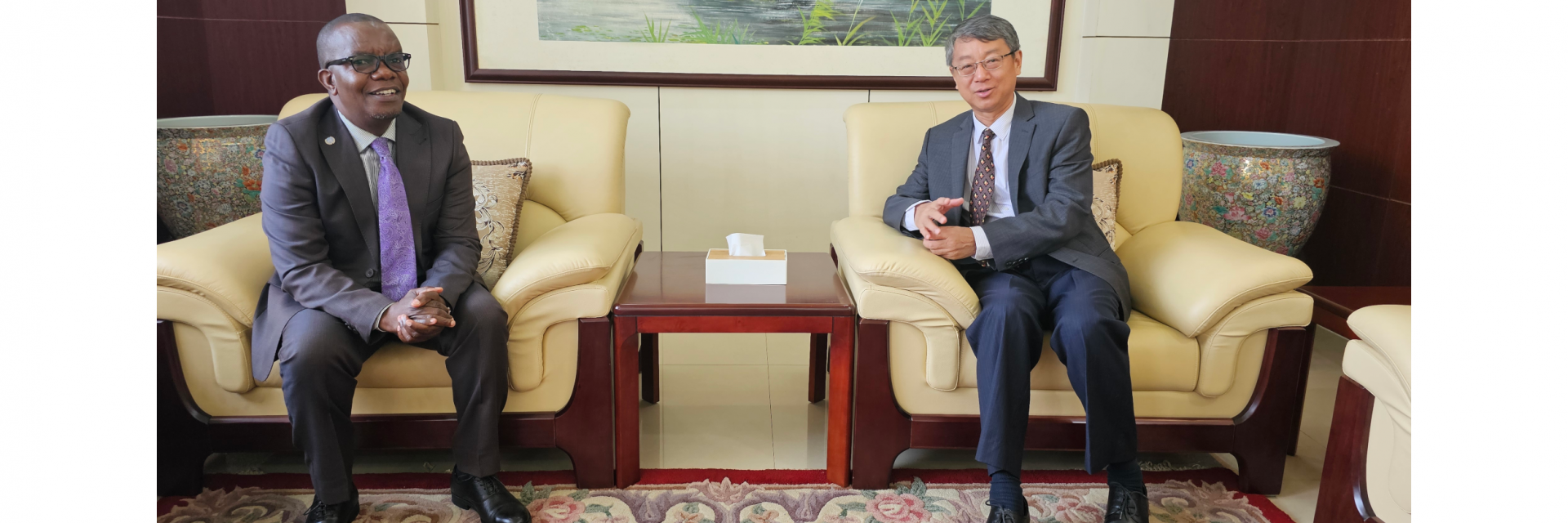Yaounde, May 10, 2024 (ECA) - "We are willing to open discussions on areas for cooperation with ECA. Agriculture is the solid foundation of any country's modernization, stability and prosperity. China attaches great importance to agriculture and the related value chains" said His Excellency Wang Yingwu, Ambassador of the People's Republic of China to Cameroon.
During the discussion He had with Jean Luc Mastaki, ECA Director for Central Africa, the Head of the Chinese Diplomatic Mission outlined the central place occupied by the agricultural development the in cooperation with Cameroon: "Food products are strategic commodities. All developed countries attach great importance to agricultural value chains and support this sector". The current state of the world economy and recent international crises comfort the diplomat's views on the central place of the sector in the structural transformation process, given the food security concerns which have risen in Cameroon and the sub-region since the outbreak of COVID19.
According to Wang Yingwu, for a successful agricultural value chain’s development in Cameroon, there is an urgent need to develop a high-quality and climate-resilient seeds system, open up markets and guarantee competitive transport services, and resolve the land access issues.
The Sub-Regional Office for Central Africa of the United Nations Economic Commission for Africa has carried out a number of analyzes on the agricultural sector in the sub-region. In the area of agro-processing, the study entitled "Exploiting the potential of agro-industry to support structural transformation in Central Africa" highlighted that, in terms of price competitiveness, Central Africa does not compete with its partners on its own market.
The report identifies high production costs, infrastructure bottlenecks, difficult access to financing and lack of modern technologies, non-conducive business climate and low economies of scale as the main factors constraining agribusiness inclusive and sustainable development in Central Africa.
As part of the Industrialization and Economic Diversification Master Plan for Central Africa, ECA is urging the sub-region to overcome these challenges through an offensive common agricultural policy: "Agro-industries and the related clusters are drivers of excellence for the development of a competitive agriculture sector in Central Africa. For the production and processing of agricultural products, these arrangements offer the ideal platforms where countries can provide facilities such as world class infrastructure, fiscal incentives, improved seeds and the promotion of customized technologies. Agro-industries and the related clusters will strengthen their inclusivity as they strengthen their linkages with local SMEs through an affirmative local content policy supported by strong quality standards and culture " explained Jean Luc Mastaki. The rural sector represents a huge pocket of vulnerability for Africa. "The development of agriculture is a perquisite pathway for an inclusive economic and social transformation, which is at the heart of ECA’s mandat", concluded Jean Luc Mastaki.
The AfCFTA provide a strong driver for agricultural transformation in Africa. A 2005 NEPAD Report on agribusiness, supply chains and quality control estimates that by 2030, the urbanization underway in Africa will trigger a regional urban demand for food products for about $150 billion. According to ECA's Economic Report on Africa 2017, this urbanization also implies a change indiets and a demand for protein-rich processed foods. Hence Jean Luc Mastaki's advocated for fostering a partnership towards sharing experience with China on the development of technical and vocational skills linked to agriculture and in promoting agricultural-led special economic zones which are both inclusive and sustainable.
Media enquiries
Zacharie Roger MBARGA - Communications Officer
United Nations Economic Commission for Africa
No 637, rue 3.069, Quartier du Lac, Yaounde, Cameroon
Phone: (+237) 222504348
Email: zacharie.mbargayene@un.org

